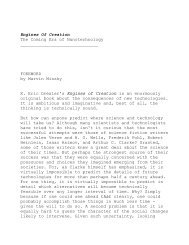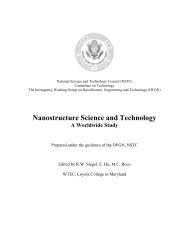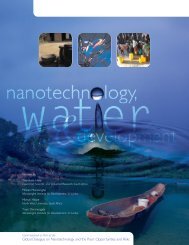Download - Nanowerk
Download - Nanowerk
Download - Nanowerk
Create successful ePaper yourself
Turn your PDF publications into a flip-book with our unique Google optimized e-Paper software.
“fight against terrorism”. “Promoting and protecting fundamental rights” was seen as a<br />
top priority by 24%; and “Quality of Justice” by 21%. Many people seem to trust their<br />
government and the EU more than their fellow citizens. This is also reflected in the latest<br />
General Eurobarometer survey held in autumn 2006. In this survey, 75% of respondents<br />
favour a common European Security and Defence Policy; 85% believe criminals must be<br />
punished more severely; and 64% want more equality and justice than individual<br />
freedom (European Commission, 2006).<br />
Still, crime and terrorism are not the biggest concerns for European citizens. According to<br />
the General Eurobarometer survey held in autumn 2005 (European Commission, 2005),<br />
unemployment (44%) and the economic situation (26%) are the most important<br />
problems respondent’s countries were facing, followed by crime (24%). Terrorism (14%)<br />
ranked seventh out of ten.<br />
Public perception of problems and threats seems to be relatively unstable and related to<br />
actual incidents. According to an earlier Eurobarometer survey (European Commission,<br />
2002), over 80% of respondents feared international terrorism, about 78% feared<br />
organized crime, about 76% proliferation of Weapons of Mass Destruction and about<br />
75% nuclear accidents. This was just after the attack on the World Trade Centre in New<br />
York.<br />
In these polls, no technical or non-technical questions were asked about solutions to the<br />
main problems. There is a pressing need for balanced information to the public before<br />
any conclusions can be drawn on whether they would accept security technologies or<br />
measures.<br />
European public awareness and opinions of different technologies including<br />
nanotechnology have been investigated in other Eurobarometer surveys. Public<br />
awareness of nanotechnology is gradually developing. According to the latest<br />
Eurobarometer study on Biotechnology, held in 2005, 42% of respondents did not know<br />
if nanotechnology would have positive or negative impacts on their lives. 40% thought it<br />
would have a positive effect, 13% expected no change, and 5% believed nanotechnology<br />
would lead to a deterioration in their quality of life. However, only 44% said they had<br />
heard of nanotechnology before participating in the Eurobarometer survey.<br />
Nanotechnology is considered morally acceptable, useful and not risky, and most<br />
respondents believe it should be encouraged. A total of 55% of respondents support<br />
nanotechnology, including both people who knew about it before and those who heard<br />
about nanotechnology for the first time (European Commission, 2006).<br />
Other studies on the public perception of nanotechnology indicate that health, safety and<br />
environment risks of engineered nanomaterials appear to be the main concern for<br />
societal groups. The public debate focuses on occupational safety and applications of<br />
nanoparticles in cosmetics, washing machines and food.<br />
Other NGO’s are worried about privacy aspects of ambient intelligence; focusing mainly<br />
on RFID chips, cameras, internet, and data collection and storage technologies. The<br />
Consumentenbond (Dutch Consumers Union) and Meldpunt Misbruik Identificatieplicht<br />
(clearinghouse for abuse of identification legislation) attended the seminar of RFID and<br />
tracing organised by ECP.NL, Rathenau Institute and RFID platform Nederland on 4 April<br />
2007. The latter NGO especially, is very concerned about the privacy implications of RFID<br />
and other security technologies and measures. The NGO European Digital Rights (EDRI)<br />
is an association of 25 European privacy and civil rights organisations, which campaigns<br />
for civil rights in the Information Society. 30 Amnesty International has a campaign on the<br />
Internet and Human Rights, fighting censorship and human rights violations by<br />
governments aided by Internet providers. 31 So far, none of them has published a<br />
statement on nanotechnology as such, although RFID chips and other security<br />
30 http://www.edri.org/<br />
31 http://irrepressible.info/<br />
54

















